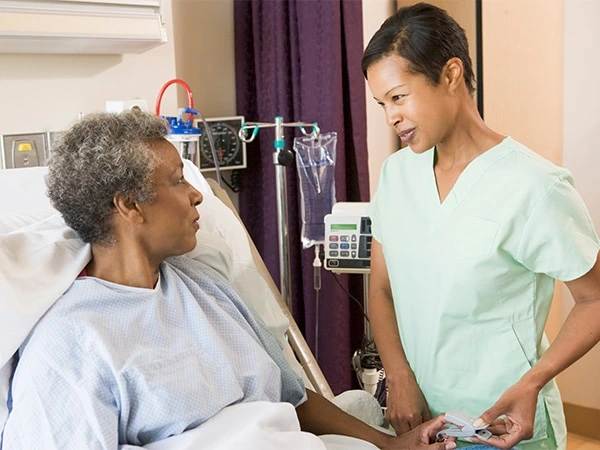Author's details
- Hakim A Abubakre
- BA (Hons) International Business Management, Msc Digital Marketing.
Reviewer's details
- Dr. Benedetto Oluwaseun Osunwusi
- MBBS, MWACS, FMCOG Consultant Obstetrician & Gynaecologist.
- The Premier Specialists' Medical Centre Victoria Island, Lagos, Nigeria.

- Date Published: 2025-03-13
- Date Updated: 2026-01-04
Uterine Cancer
Key Messages
- Uterine cancer mainly affects women after menopause, with unusual vaginal bleeding as a key warning sign.
- Early detection and prompt medical attention greatly improve treatment outcomes.
- Risk factors include age over 50, obesity, high blood pressure, diabetes, and family history of cancer.
- Treatment options include surgery, radiation, chemotherapy, and hormonal therapy.
- Regular checkups, healthy lifestyle choices, and awareness of symptoms are essential for prevention and recovery.
What is Uterine Cancer?
Uterine cancer, also known as womb cancer, affects the uterus, where babies grow during pregnancy. It primarily affects women after menopause but can occur at any age. Most cases begin in the lining of the womb (endometrium), known as endometrial cancer. A rarer type, uterine sarcoma, starts in the muscle layer of the uterus.
- Unusual vaginal bleeding (between periods, after sex or after menopause)
- Pain in the lower abdomen or pelvis
- Difficulty urinating or pain during urination
- Heavy or irregular periods
- Blood in your urine
- vaginal discharge
- Unexplained weight loss
- Pain during sex
Seek healthcare immediately if you experience:
- Unusual vaginal bleeding, especially after menopause
- Swelling or a lump in your lower abdomen
- Pain in your back, pelvis, or during intercourse
- Changes in urination or bowel movements
- Symptoms of anemia, such as tiredness and pale skin
- Age: More common in women over 50
- Obesity
- High blood pressure or diabetes
- Not having children or infertility
- Family history of cancer especially people who had Lynch syndrome.
- Prolonged use of hormone therapy (without balancing the estrogen with progesterone) for instance tamoxifen for breast cancer.
- A longer duration of menstruation : this can elevate the risk of endometrial cancer. Early onset of menstruation (before age 12) or later onset of menopause increases this risk. Essentially, the more menstrual cycles you experience, the greater the estrogen exposure to your endometrium.
Visit a healthcare provider if you notice any symptoms. Diagnosis may include pelvic exams, ultrasounds, or Endometrial biopsies( sampling and testing of the womb lining) Early detection improves treatment outcomes.
- Surgery: Removal of the uterus (hysterectomy) is often recommended.
- Radiation Therapy: High-energy rays target and kill cancer cells.
- Chemotherapy: Drugs are used to destroy cancer cells both in early and advanced cases.
- Hormonal Therapy: Some cases respond to hormone treatments that slow cancer growth.
If diagnosed or concerned about uterine cancer, consider these steps:
- Take medication as prescribed by your doctor.
- Manage pain with appropriate medication.
- Maintain a nutritious diet rich in fruits, vegetables, and grains.
- Engage in light physical activity like walking to boost energy.
- Get plenty of rest and reduce stress.
- Share your concerns with friends, family, or support groups.
- Seek help with daily tasks when needed.
Although there is no sure way to prevent uterine cancer, these actions may lower the risk:
- Maintain a healthy weight.
- Exercise regularly to improve overall health.
- Consider hormonal contraceptives (birth control pills) as they may reduce risk (consult your doctor).
- Having children and breastfeeding may lower the risk.
- Address unusual vaginal bleeding immediately by seeing a doctor.
- Consider genetic counseling if there is a family history of uterine cancer.
- Limited access to healthcare facilities, particularly in rural areas.
- A lack of awareness or knowledge about these serious medical conditions. For instance, some postmenopausal women might feel relieved or even pleased when they experience bleeding after menopause, unaware that this could be a sign of a serious health issue.
- Cultural beliefs and stigma may delay medical care.
- High cost and limited availability of specialized treatments.
Uterine cancer can be treated successfully when detected early. Regular checkups and prompt attention to symptoms can improve your chances of recovery. By staying informed and taking preventive measures, you can protect your health. Reach out to healthcare providers, local health centers, or NGOs for support and care.
- Boggess JF, Kilgore JE, Tran AQ. Uterine cancer. InAbeloff’s Clinical Oncology 2020 Jan 1 (pp. 1508-1524). Elsevier.
- Felix AS, Brinton LA. Cancer progress and priorities: uterine cancer. Cancer Epidemiology, Biomarkers & Prevention. 2018 Sep 1;27(9):985-94.
- Morhason-Bello IO, Adebamowo CA. Epidemiology of uterine fibroid in black African women: a systematic scoping review. BMJ open. 2022 Aug 1;12(8):e052053.
- https://www.nhs.uk/conditions/womb-cancer/
- https://my.clevelandclinic.org/health/diseases/16409-uterine-cancer
- https://www.google.com/search?q=symptoms+of+uterine+cancer&rlz=1C5CHFA_enGB894GB894&oq=Symptoms+of+uterine+cancer&gs_lcrp=EgZjaHJvbWUqDAgAEAAYQxiABBiKBTIMCAAQABhDGIAEGIoFMgwIARAAGEMYgAQYigUyBwgCEAAYgAQyBwgDEAAYgAQyBwgEEAAYgAQyBwgFEAAYgAQyBwgGEAAYgAQyBwgHEAAYgAQyBwgIEAAYgAQyBwgJEAAYgATSAQoxNTkzNGowajE1qAIIsAIB&sourceid=chrome&ie=UTF-8
- https://www.google.com/search?q=self+care+for+uterine+cancer&rlz=1C5CHFA_enGB894GB894&oq=Self+care+for+uterine+c&gs_lcrp=EgZjaHJvbWUqBwgBECEYoAEyBggAEEUYOTIHCAEQIRigATIHCAIQIRigATIHCAMQIRigATIHCAQQIRiPAjIHCAUQIRiPAjIHCAYQIRiPAtIBCjE4MTA1ajBqMTWoAgiwAgE&sourceid=chrome&ie=UTF-8
- https://www.google.com/search?q=When+to+seek+medical+attention+for+uterine+cancer&rlz=1C5CHFA_enGB894GB894&oq=When+to+seek+medical+attention+for+uterine+cancer&gs_lcrp=EgZjaHJvbWUyBggAEEUYOTIHCAEQIRigATIHCAIQIRiPAtIBCjMyNTA0ajBqMTWoAgiwAgE&sourceid=chrome&ie=UTF-8
- https://www.google.com/search?q=prevention+of+uterine+cancer&rlz=1C5CHFA_enGB894GB894&oq=Prevention+of+uter&gs_lcrp=EgZjaHJvbWUqDQgAEAAYkQIYgAQYigUyDQgAEAAYkQIYgAQYigUyBggBEEUYOTIHCAIQABiABDIMCAMQABgUGIcCGIAEMgcIBBAAGIAEMgcIBRAAGIAEMgcIBhAAGIAEMgcIBxAAGIAEMgcICBAAGIAEMgcICRAAGIAE0gEKMTA2MzFqMGoxNagCCLACAQ&sourceid=chrome&ie=UTF-8
